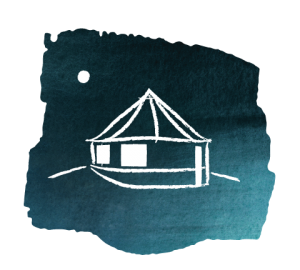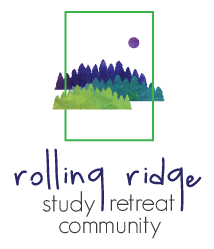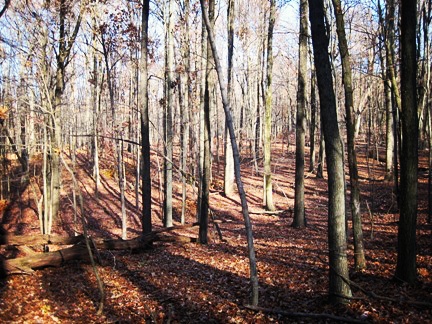This was a reflection offered near midnight on December 31, in the candlelit Meditation Shelter at Rolling Ridge, part of an annual gathering of friends and journeyers to cross the threshold together. I began writing it while on the way to visit family in North Carolina on the day after Christmas.

The Shenandoah Valley, slipping by outside the car window as we drive south on I-81, is layered in dull tones of beige and olive. Empty trees line the road and passing fields. A black cow plods up the rise of a straw-colored pasture, laboring toward a gray shed. I am reading about grief. It feels right that we are only a week out from the longest night of the year, and darkness yet lingers. I do not want to give purchase to the thought that the brown land is only resting, that the stark trees harbor the buds of spring, that the light has begun to gradually return. I am relishing the somber sky, the drained landscape, the fog clinging to the mountain tops.
It is customary on the eve of the new year in the Gregorian calendar to consider what has come to pass and what might come; this is the role of the two-faced god Janus, who guards the gate of the year with an eye to the past and the future. Good things have happened at Rolling Ridge, and surely around the world: an expanded and thriving garden, the launch of a robust forest management plan, rich and rewarding retreats, the birth of a baby, deepening community.
It has also been a year of horrible events and anguish on every level. Further, it has seemed to me that doors have slammed and hearts have hardened all across the globe, in every nation and town. Political discourse and now governance ride the waves of this division and anger at great cost to the fabric of society and the planet.
I realize that what I grieve most about this state of affairs is the evaporation of the mirage of a maturing and slowly healing society making headway against the forces of fear, scarcity, and isolation: Dr. King’s long arc bending toward justice. Watching it fade is hard, and I have sought conversations and suggestions to lend me solace: we can work harder at listening to one another, especially those whom we despise; we can practice vulnerability and humility, particularly in times when defenses are high and thick; we can identify our fears and befriend them, thus diminishing their power. We can give time, energy, and money to organizations and people who are faithfully and steadfastly protecting the Earth, working for justice, assisting refugees, promoting peace. We can hold more retreats, do better permaculture, join and deepen a community of reconciliation, write about soul and the benefits of darkness, march and bear witness.
I am coming to understand though that all this will sit heavy and dense in gut and body, like a dark cow slogging its way up a drab hill, unless and until deep investment is made in the season of winter, with its thorough and final losses, its flat and dull evocation of death. Francis Weller has written a luminous book The Wild Edge of Sorrow, which I am currently reading. It has a chapter titled “Drinking the Tears of the World,” which opens with a quote from Albert Camus, “Live to the point of tears.” The chapter includes this:
Coming home to grief is sacred work, a powerful practice that confirms what the indigenous soul knows and what spiritual traditions teach: we are connected to one another.
and
…Grief is the work of mature men and women. It is our responsibility to be available to this emotion and offer it back to our struggling world….If we refuse or neglect the responsibility for drinking the tears of the world, her losses cease to be registered by the ones meant to be the receptors of that information. It is our job to feel these losses and to mourn them.
The gift of abiding in the winter of our sorrow, of calling grief forth out of our broken hearts, is twofold. First, it is a song of belonging and connection, for surely we grieve what we love. Second, owning our sorrow mysteriously sharpens our hearing, focuses our vision, and revives us. The Quaker sage Parker Palmer wrote this about the grieving season of winter:
…. winter has an even greater gift to give. It comes when the sky is clear, the sun brilliant, the trees bare, and the first snow yet to come. It is the gift of utter clarity. In winter, one can walk into woods that had been opaque with summer growth only a few months earlier and see the trees clearly, singly and together, and see the ground that they are rooted in.
In that snowless winter place, with its brown and mulchy ground and bare trees, eventually it is possible to receive a story, or song, or choreography that is ours alone to speak or sing or dance whole-heartedly in and for this imperfect and imperiled world.
My resolution for days to come, my personal answer to what’s occurred in our nation, world, and planet, is to stay awhile in the dead landscape of winter. We have come tonight into a little shelter in that landscape, surrounded by the season’s darkness and the bare trees. Here we can be for as long as it takes, holding and offering our sorrow, drinking the tears of the world. Only then can we begin with full and vibrant hearts to re-weave the beautiful cloth, and to re-fire the shining arc of justice.

